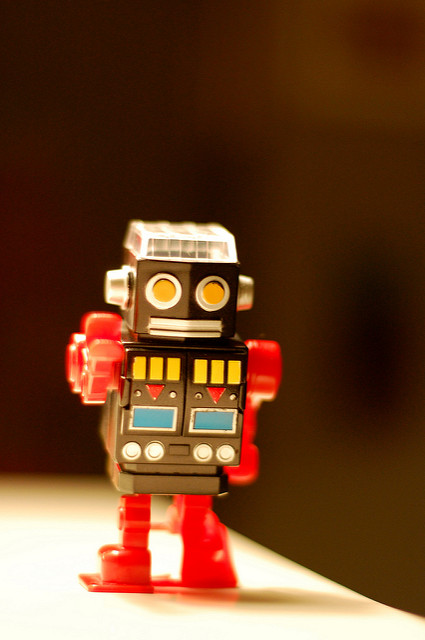
Image Credit: Eric Martin
All CIOs understand that if they are going to help their companies become more successful, then they are going to have to find ways to introduce new technology into how the company performs its processes. It turns out that in China CIOs are under a great deal of pressure to successfully accomplish this task in order to help their firms and their country achieve national goals. How are Chinese CIOs going to pull their companies forward using the latest technology?
Say Hello To Robots
The Chinese government understands the importance of information technology and has created a plan that they call “Made in China 2025”. The goal of this plan is to upgrade key Chinese companies so that they can better compete globally by 2025. The industrial areas that China hopes to become self-sufficient in by 2025 include electric cars, power equipment, marine products and computer chips. The hope is that with the help of each company’s CIO, the firms are going to be able to use the integration of technology to increase capacity, shorten their order / delivery cycles, and slash their operational costs all by at least 20%.
A great example of what Chinese CIOs have been able to accomplish is on display at one firm. At this firm’s manufacturing factory, workers work alongside of robots to create pump trucks that can get concrete up some of the world’s tallest skyscrapers. The engineers at this firm work to find out how to make their products better by analyzing the information that is sent to them in real-time by the 380,000 internet-connected concrete mixers, cranes, and excavators. To date, the company has collected over 100 billion data points from its deployed machines.
The Chinese people with the CIO job understand that they will be playing a key role in the government’s plan. They understand that the future of the heavy equipment industry will be based as much on software and data as it does on actual hardware. One of the ways that the Chinese government is hoping to motivate people in the CIO position to incorporate more technology into their companies is by making funding available to them. Billions of dollars have been made available to help companies catch up with their foreign competition.
How Technology Is Being Used To Move Chinese Firms Forward
In order for CIOs to help their Chinese companies move forward, they are going to have to introduce robots into the manufacturing process. The Chinese government has offered CIOs incentives to buy more robots. The result of these incentives is that China has become the world’s fastest growing automation market. Two years ago China installed 87,000 robots. This means that they installed more robots than the U.S. and Germany did combined.The Chinese government has grand goals for the number of robots that they want to have working in their factories. They have said that as a country they want to be able to reach a robot density of 150 per 10,000 employees. This quantity of robots will allow them to more than double the number of robots that were at work in China in 2015. However, at this rate of adoption, China will still be behind the U.S. where the ratio is 189 per 10,000 workers.
The CIO at one of the largest Chinese manufactures, Sany, has used the government’s push to modernize to create four smart factories since 2012. The company has upgraded its data-collection program as a part of this modernization. Inside of these modern factories, the company uses unmanned vehicles to deliver materials and parts to its assembly-line workers.
What All Of This Means For You
CIOs can learn by the actions of CIOs at other firms and who work in other countries. Currently CIOs in China are being encouraged by their government to find new ways to incorporate the latest technology into their company’s factories. The government is looking for ways that Chinese companies will be able to compete with foreign companies in the future and they need the help of CIOs to accomplish this.
The Chinese government’s plan to modernize their factories has been given a name: Made In China 2025. The plan is for CIOs to help their companies integrate new technology so that they can compete better. At one Chinese factory they collect data from machines that they have sold in order to improve the machines that they are currently building. The Chinese government is trying to motivate CIOs to update their factories with modern technology by making funding available to them. Currently in China robots are being introduced at a rapid pace. China wants to make robot workers more common; however, the U.S. will still be using more robots than China does. CIOs are hearing what the Chinese government is asking for and they are starting to build smart factories.
Chinese CIOs are under the gun. They have all of the same responsibilities that the rest of us have: keep the company’s servers up, protect the network, and make good technology decisions. However, at the same time they are being asked by the Chinese government to modernize their company’s factories. Chinese CIOs have a great deal of responsibility right now. Only time will tell if they are going to be able to accomplish everything that is being asked of them.
– Dr. Jim Anderson
Blue Elephant Consulting –
Your Source For Real World IT Department Leadership Skills™
Question For You: Do you think that Chinese CIOs should appoint someone else to manage the modernization of factories?
What We’ll Be Talking About Next Time
I think that we can all agree that artificial intelligence (AI) is a powerful IT tool that can allow companies to use the importance of information technology to get their IT systems to do more. CIOs have been studying the technology and attempting to understand how it can be applied to their firms. The implementation of AI at firms has been progressing fairly slowly at smaller firms simply because the complexity of implementing it is still out of their reach. Due to the importance of what AI can do for a company, CIOs need to find ways that AI can be used to help the firm move forward.

